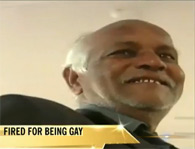We, as teachers and academics from Universities across India, read with outrage and dismay that Dr Shrinivas Ramchandra Siras, reader and chairman of Modern Indian Languages at AMU was suspended for having consensual sex with someone of the same sex within the privacy of his home. What made the press report particularly shocking was that there were either cameras placed by students within his house or TV Reporters got into the house and made a video film of the alleged incident which was then passed on to the University authorities. The University authorities instead of going by the constitutionally recognized right to privacy within the four corners of one's house have instead chosen to act against Dr Siras.

The outrage of the university authorities is deeply misdirected. Instead of suspending Dr Siras, they should have taken stern and serious action against those who so blatantly took on the role of playing moral police with no regard whatsoever for Dr. Siras’ constitutionally recognized right to privacy and dignity within his home and the University.
What is the “gross misconduct” for which Dr Siras has been suspended? It is not a crime for an adult to have consenting intimate sexual relations with another adult. It is not an offence for a adult to have consensual sex with another adult in the privacy of his home. Dr. Siras, in line with the judgment of the Delhi High Court in Naz Foundation, has also committed no legal offence. On the other hand, Dr. Siras is the victim of multiple offences - his house has been entered into without his consent and his intimate life has been filmed without his consent.
The press reports repeatedly allege that Dr Siras was having consensual sex with a “rickshaw puller.” Is the occupation or implied class status of the individual involved the reason behind the accusation of “scandal” and “outrageous” behaviour? If so, then the AMU administration is violating the tenets both of India’s constitution and of the ethics and values of an institution of higher learning with a history as long and distinguished as AMU which was built precisely to end discrimination on religion, caste or class.
One has to remember that it was only last year that Chief Justice Shah and Justice Muralidhar in holding Section 377 inapplicable to consenting sex between adults in private came up with the important distinction between public morality and constitutional morality. As they noted, “Moral indignation, howsoever strong, is not a valid basis for overriding individual's fundamental rights of dignity and privacy. In our scheme of things, constitutional morality must outweigh the argument of public morality, even if it be the majoritarian view.”
If the Naz judgment with its stress on constitutional morality is taken seriously, the immoral actions will be not be Dr Siras’ conduct but rather the actions of the University authorities in suspending him for the expression of his constitutional right, the actions of the media to blatantly invade his life as well as the possible involvement of students of the University.
This incident follows a series of events that mark the shrinking of spaces of freedom and dignity within India’s institutions of higher learning. It is imperative that we protect institutions that should be bastions of building inclusive and democratic cultures for generations to come from narrow-minded moral policing of this kind.
The open letter was signed by 80 academics from universities across India and elsewhere.











 打印版本
打印版本










读者回应
Clearly, this is not about condemning non-marital sex but homosexuality. I think the professor should hire a lawyer to study the possibility of filing a lawsuit against the university for causing loss to his employment, pension and reputation. Is there any provision under his employment contract that states that private conduct of consensual sex between adults is not to be had during his employment? Is it one of the mutually agreed condition for the termination of the contract?
Is it legal for someone to break and enter into your home? How does that work -- would you say their breaking and entering becomes legal as soon as they catch you doing something unacceptable to them?
Let's say you are renting an apartment that belongs to a Christian. Let's say that on Sundays you usually go out to spend the day with some friends or relatives, and your home is mostly empty on Sundays. Some burglars notice this habit of yours, and on one Sunday they break into your home to steal your stuff, thinking that the place is empty. But on that Sunday you happen to be at home, because you wanted to fix some broken furniture. So, when they break and enter, they find you in there, fixing your furniture.
What happens then?
(A) Can you charge them with unlawful breaking and entering?
OR:
(B) Can THEY charge YOU with violating god's law that you were not supposed to be working on a Sunday, and take pictures of you? Can your landlord then have you kicked out of your home on this charge?
This is a very important issue here. In the case of this professor, note that the police absolutely refused to accept (A), and only (B) took place.
Luckily the Indian courts show more intelligence than the so-called lawmakers.
http://timesofindia.indiatimes.com/city/allahabad/Allahabad-HC-stays-suspension-of-gay-professor/articleshow/5753322.cms
请先登入再使用此功能。